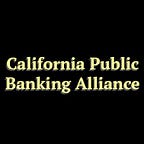Public Banks Are a Safer Alternative to Wall Street
By David Jette, California Public Banking Alliance
“It is hopeless to seek a better way, turn back” is the tired old refrain of the Wall Street lobby and their reliable allies who oppose even the exploration of public banking by California cities and counties. In Monday’s Los Angeles Times’ Editorial, “A public bank would be risky, expensive and a potential waste of tax dollars,” the Times takes a disconcertingly hardline position against a bill that will provide Californians with an alternative to predatory Wall Street banks.
To be clear: AB 857 (Assemblymembers David Chiu and Miguel Santiago) does not mandate the creation of a state or public bank, nor does it dictate what towns and cities should do with their money. It opens the door for localities to explore a public banking option responsibly with legislated transparency and oversight.
Wall Street megabanks can no longer wish away or deny the failures of their industry and the harm that it has caused to California. In 2008–2009, risky bets made by Wall Street banks collapsed the world economy and led to the loss of billions of dollars in public funds and millions of jobs and homes, amplifying the already destructive social and racial wealth gap. These bets were made by the very same banks that currently hold the deposits and investments of California taxpayer funds. From 2008 to 2012 alone, the Federal Deposit Insurance Corporation closed 465 private banks. During the turmoil of the Great Recession, some of these banks collapsed on improperly papered home loans, executing illegal foreclosures on people living in California cities and counties, stealing their nest eggs and putting families on the streets.
Millions of Californians in support of AB 857 from San Diego to Eureka are standing up to say “Enough!” and prevent these banks from doing business with public entities. From Los Angeles to San Francisco through other cities across the state, divestment movements demand that our public funds no longer be entrusted to Wall Street greed and shameless destruction of our communities and the environment.
The problem cities face in divesting from these banks, which have failed in their basic civic duties, is that nearly all major banks are guilty of predatory behavior. The City of San Jose, for example, must decide between ignoring Wells Fargo’s less than satisfactory CRA rating (cited in the LA Times no less), or waiving their Wage Theft prevention policy to hire JP Morgan Chase. Either way, the city must compromise its ethical investment responsibilities because its financial options are limited — limitations that the Editorial Board and Wall Street seek to preserve.
That is why city after city is endorsing AB 857, which will establish the framework for chartering and regulating public banks in California by giving localities a responsible option for banking our funds. A public bank’s mission is to benefit the city or region that it serves: wealth is reinvested locally.
This bill defines a public bank as being different than any other commercial bank in only one way — public banks will be owned in full by the city or county which funds them. Unlike private banks, no private shareholders will benefit from the activity of a public bank — the interest and profit earned by a public bank belongs to the community.
AB 857 answers the specific state-level questions that feasibility studies in Los Angeles, San Francisco and Oakland have already raised: public deposits will be fully insured and fully collateralized; and all banks must be approved by state and federal regulators as well as local governing bodies. They will be run as independent corporations, with professional management and a demonstrable separation of lending authority from elected officials, to prevent political patronage and to insulate localities from potential risk. As public entities, they will be fully transparent, ensuring freedom from corruption.
Opponents lean on flawed studies that say public banks would be too expensive while forgetting that Wall Street has already evaporated billions of the state’s wealth and triggered widespread austerity in the wake of their malfeasance, causing teachers, social workers, and public safety workers to lose their jobs and pensions. Wall Street banks want us to keep relying on megabanks while ignoring their track record of excessive risk and ethical transgressions. They point to long-past efforts to found public banks in the US, while staring right past the devastation their industry has caused for the climate and for working people.
Why do we rely on privately owned, shareholder-focused firms with little accountability and a history of catastrophic greed and error when another model is so successful in North Dakota, Germany, China, Costa Rica, and elsewhere?
We appreciate the Times’ observation that public banking advocates are persistent. We are. The banks are waging an asymmetrical fight against our grassroots volunteer effort. Nevertheless, we persist. Public banking advocates from a dozen cities and regions, hand-in-hand with organized labor, climate justice and housing activists, advocates for responsible government, and players from the fintech and social finance industries are working daily to bring this public banking option to California.
A vote for AB 857 is a vote to give Californians financial freedom from a Wall Street status quo that is completely divorced from the wellbeing of our communities. California cities and counties need a better way to bank, both for their financial security and integrity, and for the future of our economy and our planet.
